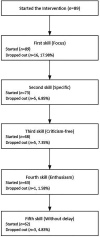User experience with a parenting chatbot micro intervention
- PMID: 36714612
- PMCID: PMC9874295
- DOI: 10.3389/fdgth.2022.989022
User experience with a parenting chatbot micro intervention
Abstract
Background: The use of chatbots to address mental health conditions have become increasingly popular in recent years. However, few studies aimed to teach parenting skills through chatbots, and there are no reports on parental user experience. Aim: This study aimed to assess the user experience of a parenting chatbot micro intervention to teach how to praise children in a Spanish-speaking country.
Methods: A sample of 89 parents were assigned to the chatbot micro intervention as part of a randomized controlled trial study. Completion rates, engagement, satisfaction, net promoter score, and acceptability were analyzed.
Results: 66.3% of the participants completed the intervention. Participants exchanged an average of 49.8 messages (SD = 1.53), provided an average satisfaction score of 4.19 (SD = .79), and reported that they would recommend the chatbot to other parents (net promoter score = 4.63/5; SD = .66). Acceptability level was high (ease of use = 4.66 [SD = .73]; comfortability = 4.76 [SD = .46]; lack of technical problems = 4.69 [SD = .59]; interactivity = 4.51 [SD = .77]; usefulness for everyday life = 4.75 [SD = .54]).
Conclusions: Overall, users completed the intervention at a high rate, engaged with the chatbot, were satisfied, would recommend it to others, and reported a high level of acceptability. Chatbots have the potential to teach parenting skills however research on the efficacy of parenting chatbot interventions is needed.
Keywords: artificial intelligence; chatbot; conversational agent; intervention; parenting; user experience (UX).
© 2023 Entenberg, Dosovitsky, Aghakhani, Mostovoy, Carre, Marshall, Benfica, Mizrahi, Testerman, Rousseau, Lin and Bunge.
Conflict of interest statement
The authors declare that the research was conducted in the absence of any commercial or financial relationships that could be construed as a potential conflict of interest.
Figures




References
-
- Kauten R, Barry CT. Externalizing Behavior. In: Zeigler-Hill V, Shackelford TK, editors. Encyclopedia of Personality and Individual Differences. Cham: Springer; (2020).
LinkOut - more resources
Full Text Sources

